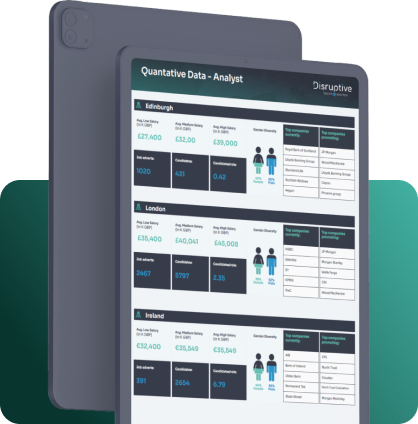AI exploded into the cultural zeitgeist with the release of Chat GPT just over a year ago. Since then, it’s become a part of people’s workflows across the world. On Episode 18 of The Disruptive Mindset Podcast we were joined by Micheal Berns, the Director of AI & FinTech at PwC Deutschland, to talk about how AI is impacting recruitment in the tech space, as well as Micheal’s advice for small businesses and startups. Read on for his insights.
How is AI being used to detect the hidden patterns in unconscious bias?
Some of my work was published in a research paper called ‘Bias Uncoded’ back in 2018. We looked at historic records of CVs to see whether we could find some past records of the recruitment process. What you often end up with when you do this historical analysis is the CVs of the people that were picked, but not from unsuccessful candidates. However, that still gives us some helpful insights.
What proved more helpful was to really look over the shoulder of the executive search firms and recruiters to say, ‘Out of this total pool of CVs you’re getting, how many are you picking? Which ones are you picking? And what are the criteria?’ You conduct interviews with the staff, you review them, then you let the model in the background do its work and determine patterns. The algorithms can bring out and display patterns to you. Some might be more obvious than others, but it will help you tease out the biases.
When you look at a more long term picture from the CVs and backgrounds of people who stay longer with the firm, what are the real success criteria? Where do they do any training? Will they do another degree? How will they move through departments? How do they align themselves with the brand? You can uncover a system that is quite transparent in terms of the biases, such as ‘You could be hiring people from outside Oxbridge or with a different gender.’ You can use those insights to show different applicants their chances too. In the current day, where a lot of companies have policies around fair employment and fair payment, you can use AI to help them on their journey through the insights that systems like that provide. That makes it easier to implement change.
How is AI and machine learning impacting the hiring process, and what possible applications of AI are there in recruitment?
Chatbots are becoming more prevalent in recruitment. In the past, either applications were not responded to at all, because the small team was overwhelmed, whereas now candidates have a chance to at least have a first discussion with a chatbot. Or it might be with an avatar, or a video interview where the recruiter is recorded. Having different channels or different approaches allows companies to create more engagement, in comparison to probably never hearing back.
For a lot of companies it’s about branding. Once you’ve found some interesting applicants, particularly in the area where you have staff shortages, you need to keep them engaged. Of course, you can have an engagement team, but you could also have a branding or marketing campaign behind the scenes that is AI-driven, based on that person’s particular interest in your website, landing pages, and so on.
Overall, a lot of these different processes are the early stages in terms of collecting potential CVs, looking at typical career paths, finding a long term match for the firm, getting the branding across during the engagement, doing the matching, making sure that things are kind of exchanged on a quick basis, and helping the hiring firms stay up to date by automating their processes. That will help busy companies not to lose out in a difficult candidate market.

How would you recommend small companies use AI technology in recruitment?
You always want to fully understand the client. You should do a maturity assessment in terms of your processes and how much data you already collect. Do you have a central site system that you enrich with things from LinkedIn and other sources? How much engagement do you get, and how do you stay in contact with the candidates afterwards? I found that some of the leading firms have established effective touch points later down the timeline.
You could also do it from a data perspective to say, ‘Okay, I’ve built some simplistic models that predict whether somebody really fits into the firm. Now, having a look at it one year later, was the right decision for them, from what my model is saying, but also their feedback? So it could be a good mix between a business perspective and a validation perspective. This is something that some of the larger players realised a long time ago, but even from a smaller company’s point of view, there are more and more dedicated solutions out there for AI and recruitment.
With generative AI, the world is already changing and taking it into account. When you start out on the journey as a smaller player, it’s really more about assessing the systems you currently have and the insights you could gain from the data, not adopting a strategy or model just because larger players have found success with it. There’s not one AI model, there are different libraries and approaches that are suitable for different setups.
You could do some cluster analysis, start with some statistical insights on hiring patterns of clients or use AI with other tools and plugins. You can find answers for important questions like ‘Is your competition moving faster? Does a competition find more suitable candidates? Are they turning them around faster? Do they have better market access to a certain area?’ and so on. Decide which AI to use based on where you are at in terms of maturity data and systems and so on, including whether you want to invest in some smaller projects or a dedicated system for AI and recruitment.
To learn more from Michael, tune into Episode 18 of The Disruptive Mindset Podcast here.


How Disruptive is your Leadership Hiring?
Find out where your management team’s weaknesses are and how you could improve your hiring strategies with this free 5 minute questionnaire.
Contact Us
"*" indicates required fields
